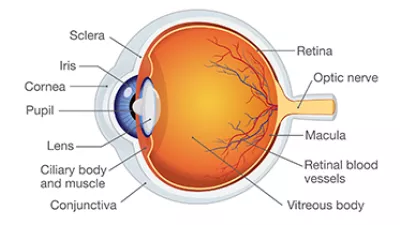Complete Care for Retinal Diseases
Our eye care specialists are highly trained professionals who fully understand common and complex eye health challenges. We are leaders in the treatment of retinal diseases and have fully dedicated doctors and staff who research, study and develop processes and procedures to help stop or slow the diseases and preserve, improve or restore your vision.
Nebraska Medicine is home to the state-of-the-art Truhlsen Eye Institute, which features outpatient eye care, a children’s eye care center, clinical research center and regional diagnostic center. The Carl Camras Center for Innovative Clinical Trials is home to the Nebraska Medicine retinal research team. This team is actively involved in research and clinical trials that have led to the development of new treatments for eye diseases, including diabetic eye disease, the leading cause of blindness in working-age adults.
We use research and the latest advances in diagnostic, medical and surgical processes and technology to care for all retinal diseases, including:
Detached and Torn Retina
A retinal detachment is a very serious problem that usually causes blindness unless treated. The appearance of flashing lights, floating objects, or a gray curtain moving across the field of vision are all indications of a retinal detachment. If any of these occur, see an ophthalmologist (Eye M.D.) right away.
Uveitis
Uveitis is inflammation of the uvea, the middle layer in the eye sandwiched between the retina (innermost layer) and the sclera (outermost layer). Symptoms can include pain, "floaters," blurriness, light sensitivity and redness. Uveitis may develop suddenly with redness and pain or with just a blurring of vision. Since the uvea nourishes many important parts of the eye, uveitis can cause permanent damage to the eye, and needs to be treated as soon as possible.
Diabetic Retinopathy
Proliferative diabetic retinopathy (PDR) is a complication of diabetes caused by changes in the blood vessels of the eye. People with PDR sometimes have no symptoms until it is too late to treat them. The retina may be badly injured before there is any change in vision. Because PDR often has no symptoms, if you have any form of diabetes you should have your eyes examined regularly by an ophthalmologist.
Our Locations
-

-

Truhlsen Eye Institute at Village Pointe Health Center
110 N 175th St.
Get Directions
Omaha, NE 68118
-
Uveitis treatment could save your vision. Here’s why
I you have an eye issue that comes on suddenly or is progressive with ongoing symptoms, it’s time to rule out an eye condition that can possibly damage your vision.
View More -
Why Make Nebraska Medicine Your Destination for Eye Care
Learn more about our top ranked facilities, care for the common to complex and dedication to clinical research.
View More
